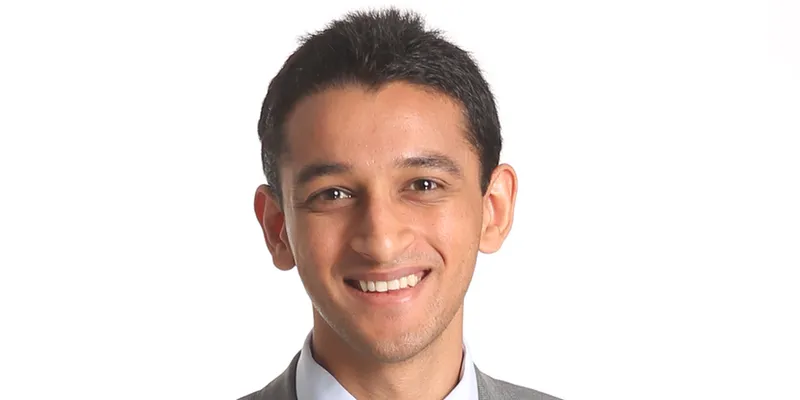This digital marketer got Rs 8 lakh funding from his boss, quit his job to start a women handbag brand
Yashas Alur worked at Dentsu Webchutney when his boss invested Rs 8 lakh so he could start a handbag brand Everpret. In 2 years, the company clocked Rs 3.5 crore turnover.
Before becoming an entrepreneur, Yashas Alur worked at Bengaluru-based Dentsu Webchutney. He saw that a new employee had just joined the digital agency, and the company had given her a laptop and a backpack.
“The next day, I saw her coming to work in formal clothes with the backpack, a handbag, and a small bag carrying lunch boxes. Carrying three bags looked out of place and didn’t suit the work attire,” Yashas says.
Yashas noticed the colleague wasn’t alone. Other women employees also carried more than one bag to work.
This sparked a thought in his head. What if the handbag was redesigned to fit all the essentials, such as a laptop, smartphone, wallet, bottle, keys, makeup, chargers, etc? If a handbag could fit all these things, there would be no need to bring multiple bags to work.
“I started talking to fabric manufacturers and suppliers to see if such a design was possible. I still held on to my full-time job during this time,” he says.
Yashas had experience in this industry. He had co-founded Buttons ‘n’ Threads, an online men's custom clothing startup that exported formal clothing, before he joined Dentsu Webchutney.

Yashas Alur, Founder, Everpret
“My time at Buttons n’ Threads gave me experience in working with fabric partners and in ecommerce. Dentsu Webchutney gave me digital marketing experience,” he says.
After talking to a Delhi manufacturer who imported vegan leather from China, Yashas came up with two designs for work handbags in 13" and 15" sizes - suitable for 13.5' laptops and 15.6" laptops.
“These two sizes could accommodate almost 90 percent of the laptops in the market and were designed to be stylish,” he says.
Yashas raised funding for his idea from an unlikely source: his boss at Dentsu Webchutney. He invested Rs 8 lakh in Yashas’ venture (the boss did not become co-founder, Yashas says, adding that he remained an investor).
“A majority of this went into inventory purchase and the remaining was used for marketing,” he explains.
Yashas quit his job in November 2017 and formally launched in January 2018. Through the Everpret website, Yashas started selling his designer handbags to working women in metro cities.
Product strategy
Yashas’ products were named Everpret Work Totes and had pockets for storing work essentials. Each bag comprised a padded laptop compartment, notebook compartment, key leash, smartphone and cards pocket, detachable bottle holder, hidden compartment, elastic loops for makeup/pens, sunglasses pocket and two slip pockets for tech essentials.

An Everpret designer handbag
“Each tote was made using premium faux leather, durable nylon lining and brushed gold hardware,” Yashas says.
He decided product pricing based on three factors: the cost of making the bags, competitors’ pricing, and the affordability of target customers.
Yashas wanted to position Everpret as an affordable premium brand, but he didn’t want to price the bags too high. “Usually, the vegan or faux leather bags made by other brands cost around Rs 2,200. But considering our premium value and the extra offerings our bags came with, we decided to price them around Rs 4,200,” he says.
Rs 4,200 may seem high, but Yashas did some market research before arriving at the number. He says he surveyed 250 working women who were just entering the workforce or were in the growth stages of their careers.
“Our target customers were women between 24 and 36 years of age. At the start of their careers, we estimated they earn around Rs 30,000 per month. Even before I started Everpret, I did a survey and found that these women were willing to spend Rs 4,200 on a bag since it was not a high repeat product,” Yashas explains.
Tough times
The 29-year-old entrepreneur didn’t have much support during Everpret’s early days. His parents helped him pack orders so he could fulfill them in time.
“Nobody else in my family was an entrepreneur. Even though I was the first, my parents were encouraging and supportive of my idea,” he says.
As Everpret’s sales picked up, Yashas faced difficulty in ensuring supply met demand. The Delhi manufacturer Everpret worked with, despite making products for larger and more popular brands, could not meet Everpret’s standards.

An Everpret product photoshoot
“We faced issues with low fabric quality, and leather the Delhi company imported from China was expensive. Further, there was a supply crunch and we were able to operate with inventory for only half of the first year,” Yashas says.
Some bags were low quality and Everpret couldn’t sell them, despite having paid the manufacturer. The company had to invest more money into buying new bags without selling the ones stocked in its inventory. Further, the manufacturer couldn’t deliver orders on time. The factors came together and caused a cash flow problem for the business, Yashas says.
The entrepreneur had to take a fresh look at his supply chain. He realised costs can be brought down and the supply can be more reliable if he directly worked with Chinese manufacturers.
Yashas took a trip to China, met fabric suppliers and manufacturers, and asked them if they would make bags for Everpret.
He struck a deal with a Chinese fabric supplier which made vegan leather accessories. Today, the 30-strong workforce makes the handbags designed by Yashas, and he sells them directly to Indian consumers.
Everpret’s direct-to-consumer approach means it doesn’t rely on middlemen to sell to the end consumer. It currently sells only through its website and is focusing on digital marketing to drive sales and growth. It uses Facebook, Instagram, and Google to drive traffic to its website, Yashas says, adding:
“However, the direct-to-consumer approach is a launch strategy and we are in the process of exploring other business strategies to grow our business. We will be exploring retail opportunities in 2020.”
Yashas says that turnaround time is anywhere between two and four days for an order to reach a customer's doorstep. He has outsourced delivery to logistics partners FedEx, Delhivery, and others.
Everpret has recorded Rs 3.5 crore turnover last year, he adds. Most sales happen in Delhi, Mumbai, Bengaluru and Chennai, and the brand may soon explore setting up pop ups kiosks in IT parks to boost brand's visibility.
The brand is still in its early stages and larger brands are yet to take notice and emulate Everpret’s strategy, Yashas says. Everpret also wants to venture into shoes, backpacks, and sling bag products in the near future.









